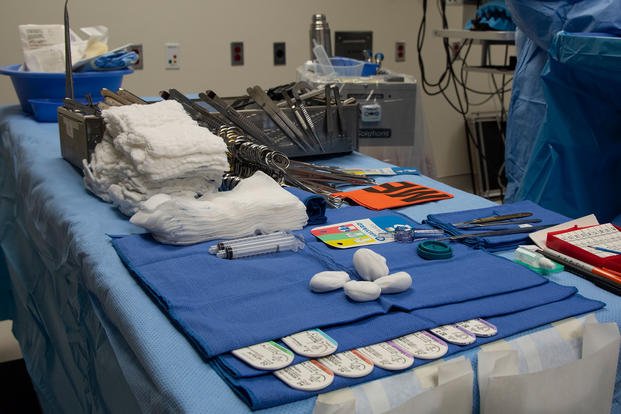U.S. service members are seeing little success in making claims for medical malpractice against military hospitals and physicians under a law passed in 2020 that allowed them to file compensation claims.
Data provided by the services to Military.com shows that troops have filed 448 claims with the Departments of the Army, Navy and Air Force seeking more than $4 billion in damages. But of those, just 11 have been settled, an approval rate of 2%, while more than one-quarter have been denied.
The Pentagon and the services declined to comment on the process, which allows troops to file claims for personal injury or death caused by providers in Department of Defense health facilities.
Read Next: Navy Says It Has Found the Source of Water Contamination Aboard Carrier, Leading to More Questions
But attorneys for some of the service members who have filed claims say the process is flawed and lacks transparency.
New York-based attorney Alan Ripka described the process as "slow and arduous," adding that the appeals process does not include debate over the merit of claims. Ripka said that those reviewing appeals simply look at whether the processing of the claim was handled and denied correctly under the rules that established the practice, with no input from troops' attorneys.
"Basically, they get to be the Yankees and their own umpire. They are umping their own game," said Ripka, who represents several service members or survivors of military personnel harmed as a result of military medical providers.
Service members are barred from suing the federal government for injuries considered to be incidental to service, including medical malpractice, under a 1950s U.S. Supreme Court ruling commonly known as the Feres doctrine.
The legislation passed in January 2020 did not alter or repeal Feres, but it provided a pathway for troops to file claims for neglect or malpractice in the military health system.
According to data from the services, the Navy has received 146 claims from sailors, Marines or their families, seeking $1.1 billion in compensation. The Navy has denied 58 claims and settled one, for $250,000.
The Army did not respond to repeated requests for information, but after publication, it sent its most recent malpractice claims data to Military.com. The service said it had 184 claims alleging damages up to $1.65 billion. It has approved six and denied 36, while another 73 cases received an initial denial and are in the appeals process. The remaining 69 are under investigation.
"Like the other military services, the Army is working diligently to resolve these claims," the service said in a statement to Military.com.
The Air Force has received 118 claims worth up to $1.3 billion. The service has settled four cases and denied 23 without the chance of an appeal. Six additional cases were appealed to the Defense Health Agency, which denied five and is still considering one remaining case.
The Air Force did not answer questions about how much it had paid out to date. In a statement provided to Military.com, Air Force Secretary Frank Kendall said the service is focused "on providing the best medical care possible to our airmen, Guardians and their families."
"It is our policy to immediately investigate any incident to prevent recurrence and improve the safety and quality of health care for our beneficiaries," Kendall said.
The Department of Defense published its final rule on the claims process on Sept. 26 in the Federal Register. By law, troops can file claims for harm caused by military or civilian physicians in military hospitals and clinics, including dental facilities. They cannot make a claim for medical malpractice that occurs in a combat zone or on a ship.
Under the rules, claims seeking less than $100,000 are to be paid out directly by the Pentagon, while the Treasury Department is responsible for reviewing and paying claims that the DoD approves above that amount.
In the final version of the rule, the DoD raised the cap on economic damages, defined as the amount of wages lost to the injury, from $500,000 to $600,000.
Ripka said that one of the reasons the services have been slow to process claims is that they didn't hire additional attorneys to handle the cases from troops. The services have maintained the same level of legal staff that they had to handle claims from civilian users of the DoD health system, including family members, retirees and their families and some civilian employees who were not previously barred from seeking damages.
Natalie Khawam, the attorney for Master Sgt. Richard Stayskal, for whom the 2020 legislation was named, said her client is still waiting for his decision while others have been denied.
"The system isn't moving fast enough," Khawam said. "Several of our clients have died waiting."
California Democrats Reps. Jackie Speier and Mark DeSaulnier introduced a bill last month that would expand the claims process to include service members who were injured on ships with large hospital facilities.
Speier said the legislation is needed to protect personnel from gross medical negligence aboard ships, like Navy Seaman Danyelle Luckey, who died aboard the carrier Ronald Reagan when she was denied medical care for an illness that required a course of antibiotics, according to her father, Derrick Luckey, who testified before Congress in March.
"Her death was a travesty, equaled only by the travesty of justice denied to her loved ones simply because of where she died," Speier said in a statement.
Editor's note: This story has been updated to include the Army's most recent claims data, shared with Military.com after publication.
-- Patricia Kime can be reached at Patricia.Kime@Military.com. Follow her on Twitter @patriciakime.
Related: Supreme Court Justice Castigates Feres Doctrine, Court in Military Rape Case












